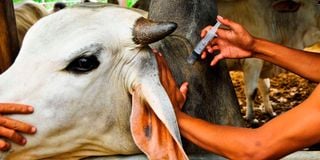Premium
Suspend vaccination project, vets advise

Cows being vaccinated against foot and mouth disease.
The Kenya Veterinary Association (KVA) has called on the government to pause the livestock vaccination campaign until all stakeholders, including veterinary professionals, farmers and local leaders, are meaningfully involved in planning and executing it.
Through a press statement, KVA said that whereas it fully supports efforts to control livestock diseases such as foot-and-mouth and peste de petis ruminants through sustained campaigns, several issues undermine the success of the vaccination programme.
For the veterinarians, one of the biggest challenges to the exercise is the credibility crisis faced by the Kenya Kwanza regime, whose actions, they noted, have eroded “any sense of public trust that Kenyans had with government institutions.”
They also faulted the government for failing to conduct adequate public sensitisation, which they said has fuelled widespread resistance and misinformation. The association also noted that the devolution of veterinary services made coordination challenges in disease control worse since counties have poorly resourced veterinary departments.
Further, the politicisation of the vaccination exercise, the said, has adversely affected the entire campaign, thus distracting the public from the goal of controlling diseases.
It is for these reasons that KVA, through national chairperson, Dr Kelvin Osore, wants the State to push the livestock vaccination campaign pushed to a future date when Kenyans and experts in the sector will have been fully informed on what the entire exercise is all about.
“The government should pause the current exercise to allow time for adequate public sensitisation and to address concerns from Kenyans. This will help ensure that livestock keepers understand the benefits of vaccination and actively participate in the programme,” Dr Osore said.
With every vaccination campaign having a specified minimum coverage to be achieved, KVA said rushing the programme at a time when the majority of Kenyans are not willing to have it will lead to failure which will only lend credibility that this exercise is meant to siphon budgeted funds, the association cautioned.
To enhance the efficiency of the exercise, the veterinarians want the government to adopt a risk-based approach that prioritises diseases endemic to specific areas instead of “blanket vaccinations” for disease in areas where it is not a pressing challenge.
The veterinarians also want the State to acknowledge the fears and worries raised by Kenyans regarding the exercise and provide them with information that will assist them in making informed decisions on whether or not to have their animals vaccinated.
“Lecturing of Kenyans by government officials will only lead to rebellion and hostility, imperilling the uptake of such programmes,” Dr Osore said.
The association wants the government to launch a robust public awareness campaign to educate farmers on the exercise and answer all questions raised by the public.
To improve the general status of livestock well-being, KVA wants the government to revisit the devolution of veterinary services to enhance coordination and allocation of resources to county veterinary departments. This intervention, they said, will go a long way in boosting the number of veterinarians in public service.
Currently, the country has slightly over 2,800 registered veterinary surgeons with only about a quarter of them in public service; a number that KVA said cannot adequately cover the number of animals in the country. To solve this crisis, the association wants the government to champion the rapid enrolment of veterinary students, improve the terms of veterinary officers and interns as well as hire more.
“The credibility crisis suffered by this government is already threatening disease control, food security and the economy, resultantly placing professional organisations in a tough position between defending a much-needed programme and empathising with Kenyans’ scepticism,” Dr Osore said.
President William Ruto has on numerous occasions, including this week, defended the vaccination programme saying the vaccines are safe and locally made.





